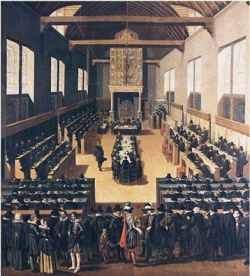The Canons of Dort, First Head of Doctrine, Rejection of Errors, Paragraph Two
 Thursday, April 24, 2008 at 07:41AM
Thursday, April 24, 2008 at 07:41AM  II Who teach that God's election to eternal life is of many kinds: one general and indefinite, the other particular and definite; and the latter in turn either incomplete, revocable, nonperemptory [admitting no refusal or denial] (or conditional), or else complete, irrevocable, and peremptory (or absolute). Likewise, who teach that there is one election to faith and another to salvation, so that there can be an election to justifying faith apart from a peremptory election to salvation.
II Who teach that God's election to eternal life is of many kinds: one general and indefinite, the other particular and definite; and the latter in turn either incomplete, revocable, nonperemptory [admitting no refusal or denial] (or conditional), or else complete, irrevocable, and peremptory (or absolute). Likewise, who teach that there is one election to faith and another to salvation, so that there can be an election to justifying faith apart from a peremptory election to salvation.
For this is an invention of the human brain, devised apart from the Scriptures, which distorts the teaching concerning election and breaks up this golden chain of salvation: Those whom he predestined, he also called; and those whom he called, he also justified; and those whom he justified, he also glorified (Rom. 8:30).
________________________________________________
At this point, the Canons deal with the problem created by basing election upon something other than a single decree of God. The authors of the Canons are primarily thinking about the Lutheran conception of God’s decree as a two-fold decree, in which it is argued that God has an antecedent will to save all [which is general and indefinite] and a consequent will to save only those who believe and who do not resist grace [particular and definite].
The Reformed contend that while this is a sincere attempt to do justice to the problems associated with God's sovereignty and human responsibility, instead of effectively summarizing what the Scriptures so clearly teach, this actually presents a complicated and rationalistic model which avoids the plain teaching of Scripture about the nature of God’s eternal purpose.
As we have repeatedly seen, the Scriptures teach a single decree of election and reprobation, in which the elect are chosen in Christ from before the foundation of the world, that Jesus Christ comes to die for them and to fulfill the law so as to provide for a sufficient righteousness so that sinners may be justified, and that in due time, the Holy Spirit calls those chosen and for whom Christ has died to faith in Jesus Christ through the preaching of the gospel. Those not chosen are left where they are, already under the just condemnation of God for their sin in Adam, as well as their actual sins.
Paul is very clear in Romans 8:28-30 that those chosen are called, those called are justified, and those justified are glorified. There is not an antecedent will, in which God calls all, but consequently wills to save only those who believe. Nothing like this can be found anywhere in the biblical text. Any conception of multiple decrees raises the specter of conflicting wills within God himself—God wills to save all, and God wills to save only those who believe and who do not resist grace. This obviously, cannot be the case and raises more questions and confusion than answers.


Reader Comments